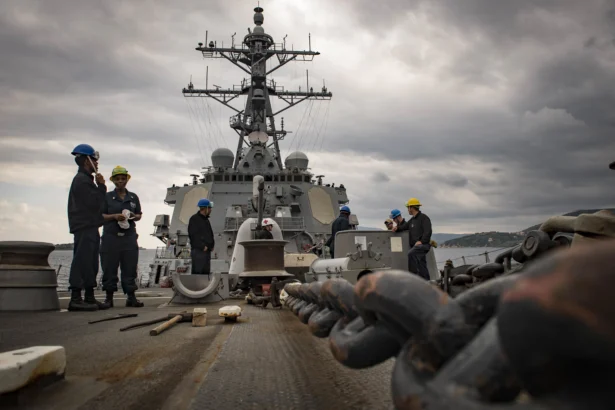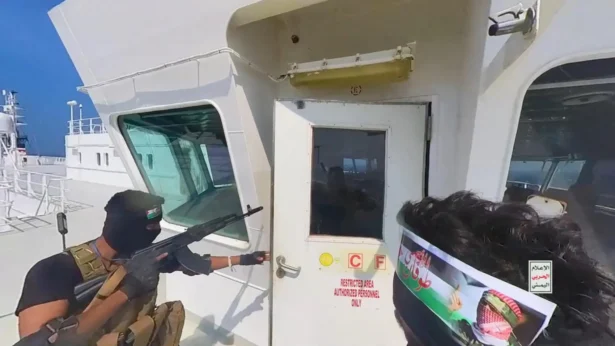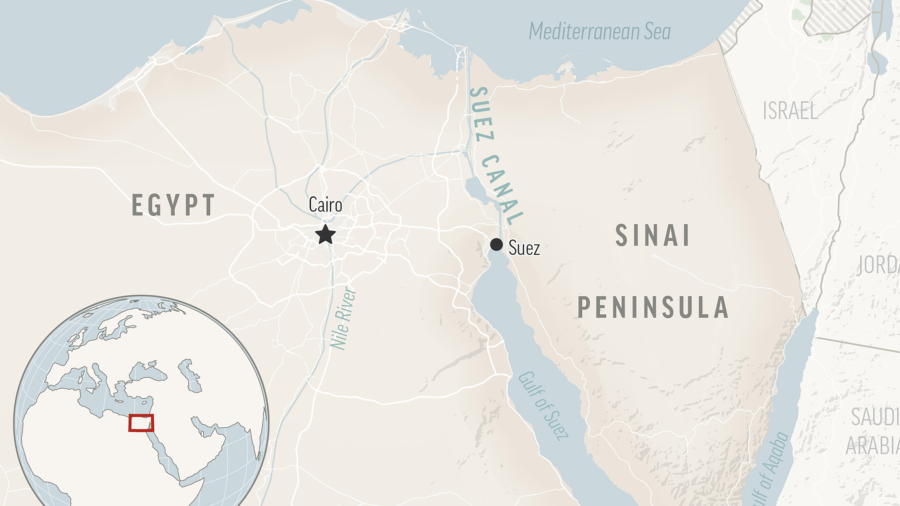A missile fired by Yemen’s Houthi rebels hit a Norwegian-flagged tanker in the Red Sea off the coast of Yemen near a key maritime chokepoint, the rebels and authorities said Tuesday.
Houthi military spokesperson Brig. Gen. Yahya Saree issued a video statement saying the rebels only fired on the vessel after it “rejected all warning calls.”
The attack on the oil and chemical tanker Strinda was confirmed by the U.S. military’s Central Command. “There were no U.S. ships in the vicinity at the time of the attack, but the USS Mason responded … and is currently rendering assistance,” Central Command said.
The Mason is an Arleigh Burke-class destroyer that has been involved in several of the recent incidents off Yemen.
Central Command said there was a fire on board the Strinda, but no casualties.
The attack follows the Iranian-backed rebels announcing on Saturday that they would attack every Israeli ship or any ship traveling the Red Sea to and from Israel unless food and medicine were allowed into the besieged Gaza Strip.
According to Geir Belsnes, the CEO of the vessel’s operator J. Ludwig Mowinckels Rederi, the Strinda departed in Malaysia and was bound for Italy with a cargo of palm oil.
However, Brig. Gen. Saree alleged that the ship was bound for Israel without offering any evidence.
With the assault, the Houthi rebels appear to have expanded their campaign of targeting Israel-linked ships into also striking those that have no clear ties to Israel, thereby casting a cloud over Europe and North-America-bound cargo and energy shipments coming through the Suez Canal.
Since Oct. 19, the Houthis have carried out three missile attacks on commercial ships, two acts of piracy—one of which was successful—and numerous drone attacks.

Two American warships, the USS Thomas Hudner and the USS Carney, have also been targeted by the Houthis.
On Sunday, the French military said that one of its frigates, the Languedoc, shot down two drones in the Red Sea that flew in from Yemen’s coast.
Washington so far has declined to directly respond to the attacks, as has Israel, whose military continues to describe the foreign ships as not having links to their country.
However, Israel’s national security adviser, Tzachi Hanegbi, said over the weekend that the country has called on its Western allies to address the threats from Yemen and would give them “some time” to organize a response. But he added that if the threats persist, Israel would take matters into its own hands and “remove the blockade.”
Global shipping has increasingly been targeted as the Israel-Hamas war threatens to become a wider regional conflict. The collapse of a seven-day cease-fire and the resumption of a punishing Israeli ground offensive and airstrikes on Gaza have raised the risk of more sea attacks.
The Bab el-Mandeb Strait is only 29 kilometers (18 miles) wide at its narrowest point, limiting traffic to two channels for inbound and outbound shipments. Nearly 10 percent of all oil traded at sea passes through it, according to the U.S. Energy Information Administration.

In November, Houthis hijacked the Galaxy Leader, a vehicle transport ship linked to Israel in the Red Sea off Yemen. The rebels still hold the vessel near the port city of Hodeida.
According to private intelligence firm Ambrey “the incident displayed a significant increase in the Houthis’ capability to disrupt merchant shipping,” while providing them with a negotiation lever.
“In the past, the Houthis had only used sea mines, missiles and remote-controlled improvised explosive devices in the Red Sea,” Ambrey said.
The firm concluded that “the sophistication of the operation suggests that Iranian involvement is highly likely.”
The Associated Press contributed to this article.

